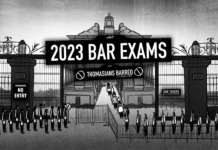Let’s get one thing straight—substitution of candidates is legal.
Section 77 of the Omnibus Election Code makes it so. According to the law, candidates can be substituted in case of death, disqualification, and withdrawal.
For the 2022 elections, the Commission on Elections (Comelec) has set November 15 to be the last day of substitution of withdrawn candidates. It is also the last day for the substitute of an official candidate of a political party or coalition who withdrew, died, or was disqualified by final judgment, to file a certificate of candidacy (COC) in order to reflect the name of the substitute on the official ballot. Substitution can also be made past November 15 to mid-day of election day in the event of a candidate’s death and disqualification, as long as the replacement has the same surname as the person being substituted.
The most famous case of candidate substitution in the Philippines was that of now-president Rodrigo Duterte. The then-Davao City mayor was able to join the 2016 national elections thanks to a handover from Martin Diño, a barangay captain at the time, who had been PDP-Laban’s presidential candidate until he backed out supposedly because he felt “insulted” by the Comelec that branded him a nuisance candidate.
Six years on, another Duterte is being linked to substitution. Davao City Mayor Sara Duterte-Carpio on November 9 further fueled rumors of her seeking higher office in the 2022 elections as she announced her withdrawal from reelection, less than a week before the deadline of substitution. She resigned from Hugpong ng Pagbabago, the regional political party she established, by way of a handwritten letter on November 11.
Sara is an unquestionable powerhouse. She had led presidential surveys prior to the October 8 deadline of filing of COCs for all elective posts and has remained a preferred candidate of many pro-administration political parties despite her claiming numerous times that she would seek reelection in Davao. Should she join the presidential or vice presidential race, she would definitely garner votes, especially in Mindanao.
But there has to be something said about the rule of substitution.
Pro-administration political parties have explicitly admitted fielding placeholders for the 2022 polls. Lakas-CMD fielded obscure candidates Anna Capela Velasco and Lyle Fernando Uy for president and vice president, respectively. The Cusi faction of PDP-Laban fielded Sen. Ronald “Bato” de la Rosa and Sen. Christopher Lawrence “Bong” Go for the top two positions.
Lakas-CMD’s secretary general Prospero Pichay said Velasco and Uy were mere placeholders as his party awaited Sara’s decision. De la Rosa also admitted that he was hoping for Sara’s presidential bid and that he would be willing to step aside should she seek to succeed her father.
The Comelec actually has the power to cancel the COCs of candidates it would deem as nuisance ones, or those aiming to make a mockery out of the elections.
According to the poll body’s website, “[a]ny candidate for any elective office who filed his certificate of candidacy to put the election process in mockery or disrepute or to cause confusion among the voters by the similarity of the names of the registered candidates or who by other acts or circumstances is clearly demonstrated to have no bona fide intention to run for the office for which the certificate of candidacy has been filed, thus preventing a faithful determination of the true will of the electorate, may be declared a nuisance candidate and his certificate of candidacy may be denied due course or may be canceled.”
Sara has the right to run and change her mind. But for the sake of fairness, the Comelec should not be an enabler of candidates and political parties that make a mockery out of the elections through their telenovela writing skills and ploys.















